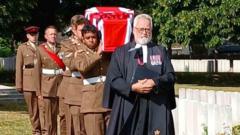Did Area 51 Guards Suffer Fatal Diseases from Secret Projects?

US Air Force Veterans and the Hidden Dangers of Area 51
The narrative surrounding Area 51 has long been shrouded in secrecy, conspiracy theories, and speculation about extraterrestrial activities. However, a darker reality is becoming increasingly evident as US Air Force veterans share their harrowing experiences related to health complications stemming from their time at the Nevada Test and Training Range (NTTR). Reports indicate that many workers at this covert military installation have suffered from severe illnesses, particularly cancer, attributed to radiation exposure. This article delves into the alarming revelations from veterans, the long-standing issues surrounding their health care, and the ongoing legislative efforts to support those affected.
The Silent Suffering of Area 51 Veterans
For years, veterans like former Air Force Sergeant David Crete have bravely stepped forward, recounting their service at NTTR, which was established in the 1970s on land contaminated by previous nuclear testing. Sergeant Crete, who served between 1983 and 1987, shared his horrifying reality with the House Veterans Affairs Committee: he is experiencing severe neurological issues, including brain atrophy. Tragically, he is one of the few survivors among his colleagues, with approximately 490 of his co-workers reportedly succumbing to serious illnesses since their service. This shocking statistic underscores the critical health risks associated with exposure to radiation at such sites.
The Invisible Killer: Radiation Exposure
The term 'invisible killer' aptly describes the hazards posed by radiation at NTTR. Many veterans are now grappling with debilitating health problems, but they face significant challenges when it comes to accessing medical care through the US Department of Veterans Affairs (VA). The primary issue lies in the inability to prove their radiation exposure due to the classified nature of their work. Records of their service have been 'data masked,' leaving veterans to navigate a bureaucratic maze that often denies them necessary treatment.
Health Consequences for Veterans and Their Families
The repercussions of radiation exposure do not stop with the veterans themselves. Many have reported alarming health issues among their family members. Sergeant Crete recounted the heart-wrenching experiences of his wife, who suffered three miscarriages, and a fellow serviceman whose wife experienced seven miscarriages. Furthermore, Crete revealed that all four of his children were born with significant health problems, raising questions about the potential intergenerational effects of radiation exposure.
The Government's Response
Despite the alarming reports and testimonies from veterans, the government has maintained a stance that prioritizes national interests over the health concerns of those who served at NTTR. A government report suggested that halting projects at the base would be against the national interest, effectively sidelining the health risks faced by workers. This lack of acknowledgment and support has left many veterans feeling abandoned and overlooked.
Legislative Efforts for Support
In response to the growing concerns and the plight of veterans, two significant Congressional bills have been introduced: the Protect Act and the Forgotten Veterans Act. These bills aim to provide enhanced support and benefits to those who served at NTTR. The introduction of these bills marks a step toward recognizing the sacrifices made by veterans and ensuring they receive the medical care they desperately need.
Historical Context: Previous Legislative Actions
The issue of veterans' health related to exposure at government sites is not new. In 2000, a bill was signed into law by then-President Bill Clinton to offer compensation to veterans who had worked at specific sites. However, many veterans, including those from NTTR, feel that these measures have not gone far enough. Sergeant Crete highlighted the lack of acknowledgment from the government, noting that the only recognition he received was from the late US Senator John McCain, who stated that his unit played a crucial role in ending the Cold War.
Personal Stories of Resilience
Veterans like Pomp Braswell have also shared their experiences at NTTR. Reflecting on his time there, Braswell described the sense of pride he felt as a young airman, despite his mother being completely unaware of the nature of his work. This sentiment of secrecy is common among veterans who served in classified roles, often leaving them with an emotional burden as they grapple with the implications of their service on their health and family well-being.
The Ongoing Battle for Recognition and Care
As veterans continue to advocate for their rights and recognition, the struggle remains complex. The challenges they face include not only health issues but also the psychological toll of feeling abandoned by the government they served. Many veterans are left to fend for themselves in navigating a system that has historically overlooked their needs. The lack of transparency and accountability surrounding radiation exposure at NTTR compounds their frustrations.
The Impact of Secrecy on Veterans
The top-secret nature of work at NTTR has created an environment of silence. Veterans often cannot discuss their experiences, leaving them isolated and without a support network. The stigma attached to their health issues, compounded by the lack of official acknowledgment, can exacerbate feelings of helplessness. This silence highlights a broader issue within veteran care, where acknowledgment and understanding are crucial for recovery and support.
Moving Forward: What Needs to Change?
The plight of NTTR veterans is a call to action for policymakers and the public alike. It is essential to address the gaps in care and support for those who have sacrificed their health for national security. Increased transparency regarding radiation exposure, the establishment of comprehensive health care programs for affected veterans, and robust legislative measures are imperative to ensure that these individuals receive the recognition and care they deserve.
Building Awareness and Support
Raising awareness about the challenges faced by Area 51 veterans is crucial for fostering a supportive community. Advocacy groups and veteran organizations must work together to amplify these voices, ensuring that their stories are heard and their needs met. Public campaigns can help shine a light on the darker aspects of military service, urging the government to take decisive action.
Conclusion: A Call to Action
The stories of US Air Force veterans who served at NTTR reveal a troubling reality that has been kept hidden for too long. As they navigate health issues and fight for recognition, it is vital that society takes notice and supports their quest for justice. The introduction of legislative measures is a step in the right direction, but more must be done to ensure that those who served our country receive the care and acknowledgment they deserve.
Frequently Asked Questions
What health issues are reported by veterans from Area 51?
Veterans have reported severe health issues, including various cancers, neurological disorders, and birth defects among their children, attributed to radiation exposure at the Nevada Test and Training Range.
What legislative measures are being taken to support these veterans?
Two bills, the Protect Act and the Forgotten Veterans Act, have been introduced to provide more support to veterans who served at NTTR, addressing their health care and compensation needs.
Why is it difficult for veterans to prove their exposure to radiation?
The secretive nature of their work at NTTR has led to 'data masking' of service records, making it challenging for veterans to provide evidence of their radiation exposure to access necessary medical care.
As we reflect on the sacrifices made by these veterans, it is essential to consider how we can advocate for better support and recognition for those who have served. What can we do to ensure that their stories are heard, and their needs are met? #VeteransSupport #Area51 #HealthCareReform
```Published: 2025-07-19 09:47:11 | Category: News



